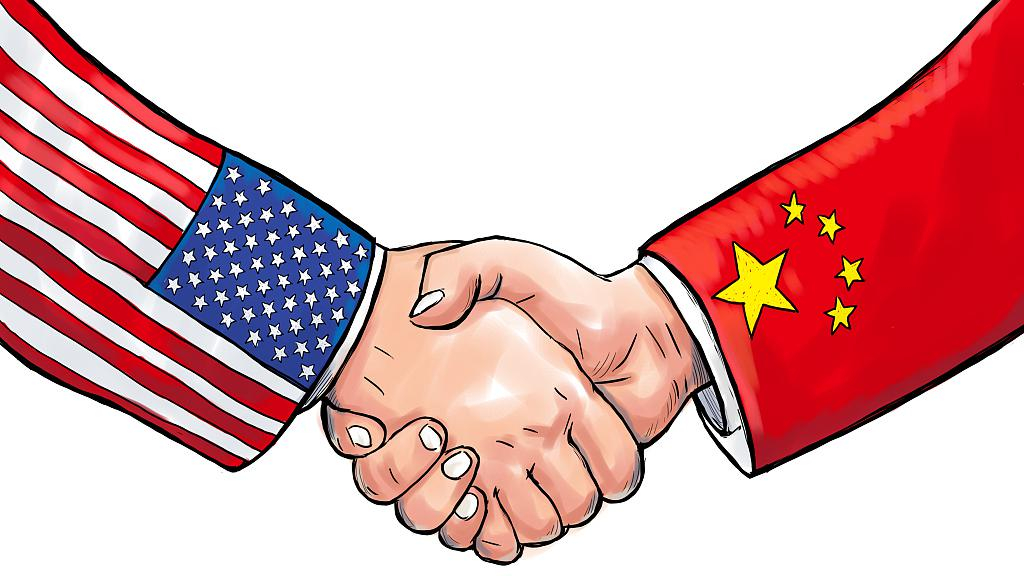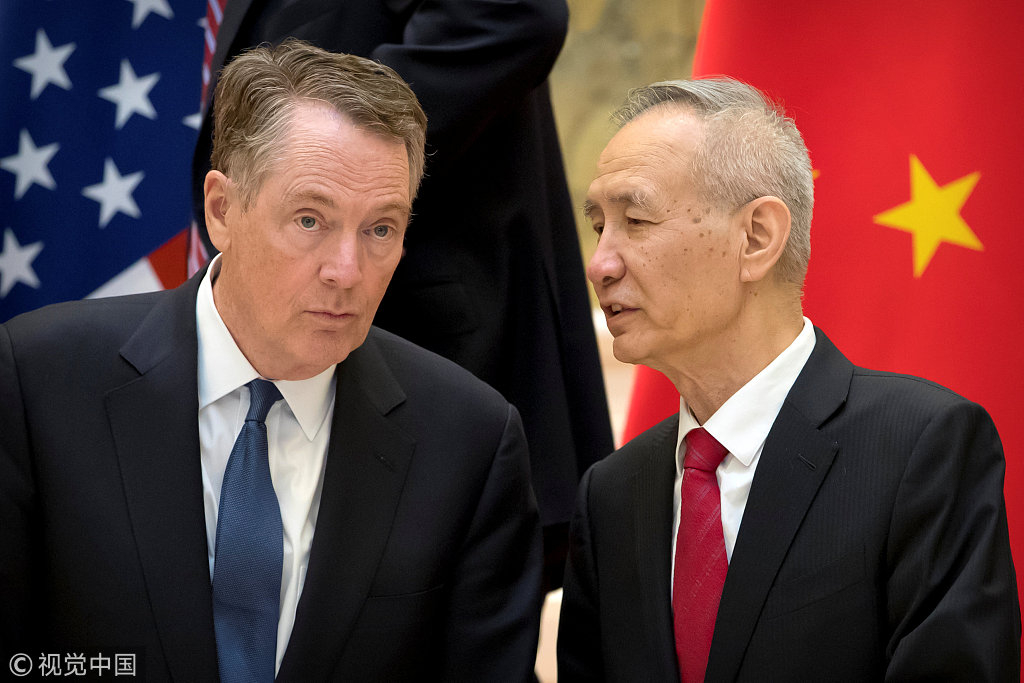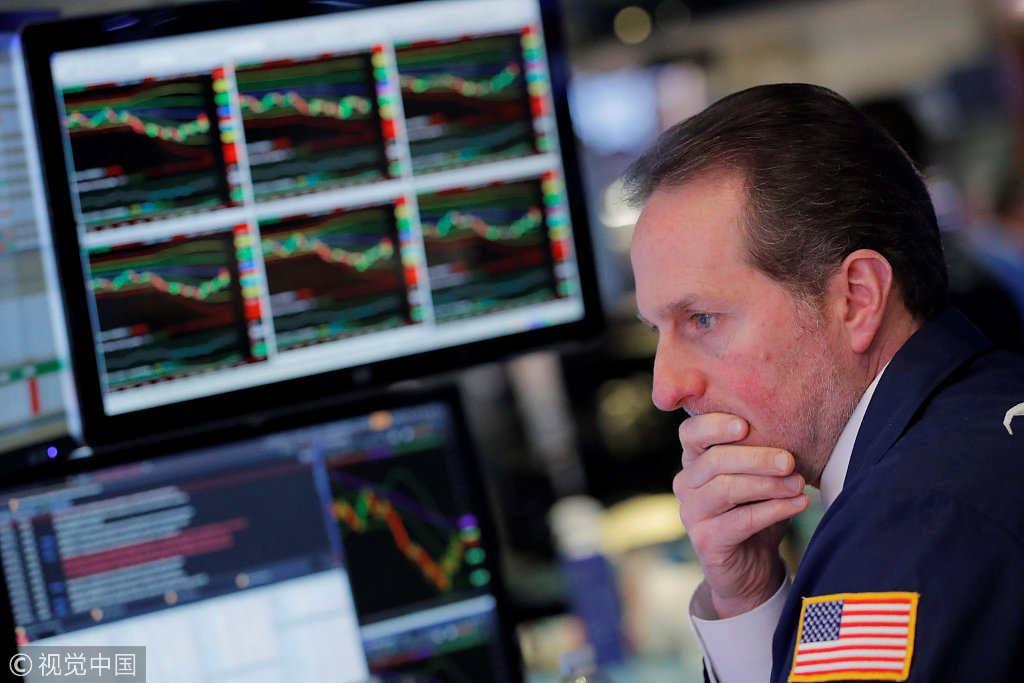
Opinion
22:45, 29-Mar-2019
Mutual trust is a prerequisite to Sino-U.S. deal
Liu Jianxi

As top negotiators conclude their meeting in Beijing and plan a meeting next week in Washington to end the protracted trade fight between the world's two largest economies, Western media outlets strike a positive tone on the prospect of a final trade deal.
"If you looked at the texts a month ago compared to today, we have moved forward in all areas," Reuters quoted an anonymous U.S. official as saying. Although no details have been released so far, the two sides are reported to have witnessed major breakthroughs on "forced" technology transfer and other core issues that bogged the two economies down into the current quagmire.
"They [Chinese negotiators] are talking about 'forced' technology transfer in a way that they've never wanted to talk about before – both in terms of scope and specifics," the anonymous official reportedly said.
In the months of on-again, off-again trade talks, Beijing has shown its utmost sincerity in hashing out a fundamental solution to address U.S. concerns and has been taking actual actions to fulfill its words.
Earlier this month, Beijing passed a foreign investment law ensuring foreign investors be treated on an equal footing with their Chinese counterparts in sectors that are not on the negative list. It has also agreed to periodic meetings at different governmental levels that would allow Washington to "keep tabs on China's behavior."

U.S. Trade Representative Robert Lighthizer, left, listens as Chinese Vice Premier Liu He talks while they line up for a group photo at the Diaoyutai State Guesthouse in Beijing, China, February 15, 2019. /VCG Photo
U.S. Trade Representative Robert Lighthizer, left, listens as Chinese Vice Premier Liu He talks while they line up for a group photo at the Diaoyutai State Guesthouse in Beijing, China, February 15, 2019. /VCG Photo
China is strengthening intellectual property protection and prohibiting forced technology transfers via legal and administrative means. But still, this is not satisfactory to the demanding Unites States.
The Trump administration is insisting on an enforcement mechanism, under which the U.S. would be allowed to impose snapback tariffs on China but the Chinese government cannot retaliate. This remains as the deepest division in Sino-U.S. trade talks.
China is willing to open its economy further to the outside world but will never accept a deal that runs contrary to its fundamental interests. The trade agreement must be "two way, fair and equal."
Putting such an unequal mechanism on the table, Washington is naive to treat Beijing the same way as it did in the 19th century. China is no longer the poor and weak country it was in 1840 when the first Opium War broke out. After almost 180 years of development, the country has risen to become the world's second largest economy and the top contributor to global GDP growth.
The United States has been used to acting arrogantly toward developing countries as the world's superpower. The transition in the global power structure is not something that it is ready to accept.
The U.S. under Trump has been perplexed by a slew of economic and political challenges in recent years. While the curtain of the Russiagate drama has not fallen in the Oval Office, the superpower is scorched from slowing economic growth. In this context, China's rapid rise has further raised its anxiety level.

A trader on the floor of the New York Stock Exchange watches the stock market drop on his screen shortly before the closing bell in New York, U.S., April 6, 2018. /VCG Photo
A trader on the floor of the New York Stock Exchange watches the stock market drop on his screen shortly before the closing bell in New York, U.S., April 6, 2018. /VCG Photo
Despite tremendous benefits Western companies reaped from cooperating with China, Washington still blames Beijing for its rising unemployment rate, trade imbalance, slowing economy and all the other headaches it is going through.
A lack of mutual trust is the root cause. Differences in political systems have aggravated Western suspicions against the “strategic intentions” of China's rise. Under the Cold War mentality, so-called American elites have habituated to viewing China's socialist system and its governing model from a negative point of view.
Given the above, fostering and deepening mutual trust is a priority for China and the United States at the current stage. Beijing has shown its utmost sincerity in talks, but Washington, having no trust in Beijing, has been putting forward unjustified proposals during the trade negotiations.
It is high time that the U.S. abandons stereotypes and fosters mutual trust with China. This is a prerequisite to a fundamental deal that is in the interests of not only the two economies, but also the entire world.
(If you want to contribute and have specific expertise, please contact us at opinions@cgtn.com)

SITEMAP
Copyright © 2018 CGTN. Beijing ICP prepared NO.16065310-3
Copyright © 2018 CGTN. Beijing ICP prepared NO.16065310-3